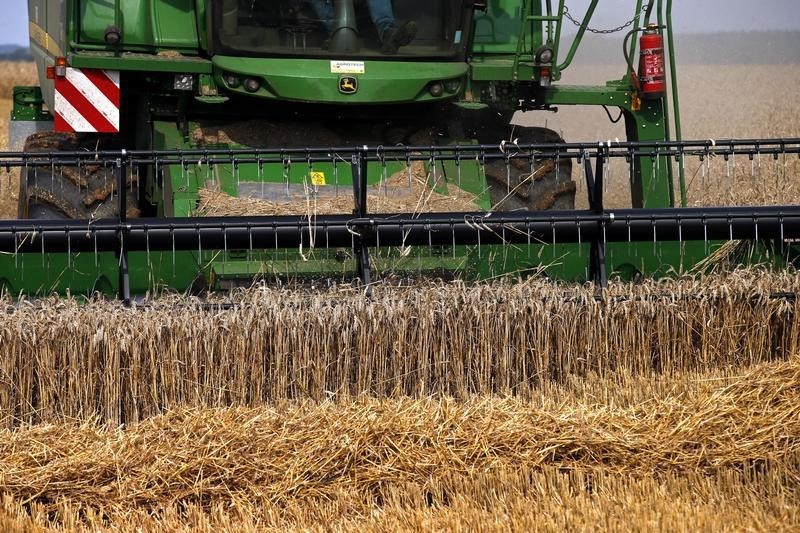By Rod Nickel
WINNIPEG, Manitoba, Dec 1 (Reuters) - Alberta's government
will retool a bill that would overhaul workplace standards on
farms in Canada's biggest cattle-producing province, its
agriculture minister said on Tuesday, after protests by farmers
and ranchers.
Alberta, the second-largest wheat-growing province, elected
a leftist New Democratic Party government in May after 44 years
of Conservative rule. It is planning sweeping changes for its
43,000 farms and ranches, saying that current standards offer
workers less protection than elsewhere in Canada.
For example, the government currently cannot investigate
on-farm worker accidents.
But the government has flubbed communication and is now
considering amendments, Alberta Agriculture Minister Oneil
Carlier said in an interview. The government wants to clarify
that children will still be able to work on family farms, he
said.
"The intention was not to affect the family farm or the
interaction of the children on the farm," Carlier said. "These
amendments will ... give a certain level of comfort to farmers."
Hundreds of farmers demonstrated outside the Alberta
legislature in Edmonton on Monday, while others blocked highway
traffic with trucks and tractors. Farm groups say the main
problem is a lack of meaningful consultation.
The issue drives to the heart of traditional farming on the
Prairies, where children routinely help with farm work. Farms
have also become larger, requiring the use of more hired
workers.
A 10-year-old boy was killed last month in rural Alberta
operating a forklift near his farm.
The government's first step, on Jan. 1, is to remove farm
exemptions to existing employment standards, such as hours of
work, overtime pay, restrictions on employing children and
workers' ability to join unions.
The government will also require that farmers pay premiums
toward compensation for workers hurt on the job.
Changes would apply to any worker, including unpaid
neighbors and children of farmers who help during busy periods.
Existing regulations and codes will then be amended further
by 2017 after consultations with farmers.
Matt Sawyer, who produces cattle and grain near Acme,
Alberta, said the proposed changes will cost him time and money.
Injury compensation premiums for Sawyer's two seasonal
workers would be an extra expense, and rigid working hours could
bog down planting and harvesting, he said.
"You've got a very narrow window on a perishable commodity,"
Sawyer said, adding the bill "seems wild and not necessary."
- English (USA)
- English (UK)
- English (India)
- English (Australia)
- English (South Africa)
- English (Philippines)
- English (Nigeria)
- Deutsch
- Español (España)
- Español (México)
- Français
- Italiano
- Nederlands
- Português (Portugal)
- Polski
- Português (Brasil)
- Русский
- Türkçe
- العربية
- Ελληνικά
- Svenska
- Suomi
- עברית
- 日本語
- 한국어
- 简体中文
- 繁體中文
- Bahasa Indonesia
- Bahasa Melayu
- ไทย
- Tiếng Việt
- हिंदी
Canada's Alberta to retool controversial farm safety changes

Latest comments
Install Our App
Risk Disclosure: Trading in financial instruments and/or cryptocurrencies involves high risks including the risk of losing some, or all, of your investment amount, and may not be suitable for all investors. Prices of cryptocurrencies are extremely volatile and may be affected by external factors such as financial, regulatory or political events. Trading on margin increases the financial risks.
Before deciding to trade in financial instrument or cryptocurrencies you should be fully informed of the risks and costs associated with trading the financial markets, carefully consider your investment objectives, level of experience, and risk appetite, and seek professional advice where needed.
Fusion Media would like to remind you that the data contained in this website is not necessarily real-time nor accurate. The data and prices on the website are not necessarily provided by any market or exchange, but may be provided by market makers, and so prices may not be accurate and may differ from the actual price at any given market, meaning prices are indicative and not appropriate for trading purposes. Fusion Media and any provider of the data contained in this website will not accept liability for any loss or damage as a result of your trading, or your reliance on the information contained within this website.
It is prohibited to use, store, reproduce, display, modify, transmit or distribute the data contained in this website without the explicit prior written permission of Fusion Media and/or the data provider. All intellectual property rights are reserved by the providers and/or the exchange providing the data contained in this website.
Fusion Media may be compensated by the advertisers that appear on the website, based on your interaction with the advertisements or advertisers.
Before deciding to trade in financial instrument or cryptocurrencies you should be fully informed of the risks and costs associated with trading the financial markets, carefully consider your investment objectives, level of experience, and risk appetite, and seek professional advice where needed.
Fusion Media would like to remind you that the data contained in this website is not necessarily real-time nor accurate. The data and prices on the website are not necessarily provided by any market or exchange, but may be provided by market makers, and so prices may not be accurate and may differ from the actual price at any given market, meaning prices are indicative and not appropriate for trading purposes. Fusion Media and any provider of the data contained in this website will not accept liability for any loss or damage as a result of your trading, or your reliance on the information contained within this website.
It is prohibited to use, store, reproduce, display, modify, transmit or distribute the data contained in this website without the explicit prior written permission of Fusion Media and/or the data provider. All intellectual property rights are reserved by the providers and/or the exchange providing the data contained in this website.
Fusion Media may be compensated by the advertisers that appear on the website, based on your interaction with the advertisements or advertisers.
© 2007-2024 - Fusion Media Limited. All Rights Reserved.